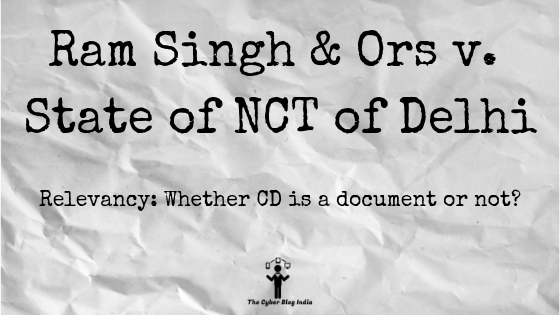Ram Singh & Ors v. State of NCT of Delhi

Ram Singh & Ors v. State Of NCT Of Delhi
In the Delhi High Court
Crl. Rev. P. 124/2013
Before Justice G.P. Mittal
Decided on Mar 7, 2013
Relevancy of the case: Whether CD is a document or not?
Statutes & Provisions Involved
• The Information Technology Act, 2000 (Section 2)
• The Code Of Criminal Procedure 1973 (Section 327, 482)
• The Indian Evidence Act 1872 (Section 145, 146, 155)
Relevant Facts
• The petitioners have approached this Court for setting aside of the order dated 08.02.2013 passed by the learned Additional Sessions Judge whereby the petitioner’s prayer was rejected by the learned ASJ on the grounds, first that the interview being in violation of Section 327(3)of the Code was illegal, second on the ground that the press interview given to any news channel cannot be attached to any credibility and thus, the court should not take the same into consideration.
Prominent Arguments by Advocates
• V.K. Anand, learned counsel for petitioners, relied on Bipin Shantilal Panchal v. State of Gujarat & Anr (2001 3 SCC 1), that if there was any objection as to the admissibility of the video CD containing the interview, the same ought to have been recorded by the learned ASJ and subject to objection, petitioners ought to be permitted to confront the complainant with his previous statement in CD if there was any material variation. The counsel also relied on State of Gujarat v. Shailendra Kamalkishor Pande & Ors (2008 Cri.L.J. 953) wherein there were similar circumstances.
• Dayan Krishnan, learned counsel for State, supports the impugned order on the ground that Section 327(2) of the Code mandates that the inquiry into and trial of an offence of rape, where any proceedings are held in camera and as per Section 327(3) where any proceedings are held in camera, it is not lawful for any person to print or publish any matter in relation to any such proceedings except with the previous permission of the Court. The counsel submitted that the interview given by the complainant to Zee News on 04.01.2013 was illegal. Referring to Ranu Hazarika v. State of Assam, (2011) 4 SCC 798, the counsel argued that permitting an evidence illegally taken would perpetuate and encourage an illegality.
• Referring to State v. Navjot Sandhu (2005 11 SCC 600), Sidhartha Vashisht v. State (2010 6 SCC 1), the learned counsel argued that the court not only declined to look into the interview but also observed that the trial by media hampers a fair investigation. The court reminded that media should perform the acts of journalism and shouldn’t act in a manner which interferes with the administration of criminal justice. The counsel submitted that a video CD cannot be said to be a previous statement in writing and thus could not be used to impeach the credit of a witness.
Opinion of the Bench
• The use of video CD to confront the witness is subject to proving its relevancy and authenticity. The weight to be given to such evidence is however distinct and separate from the question of its admissibility. The defence is ultimately obliged to establish the genuineness of the CD. It is only after the defence discharges this obligation that the trial court would be able to consider it as evidence. Therefore, when the question is as regards to the admissibility of a document in form of a CD, there shouldn’t be any serious objection because the trial Court will consider the authenticity at the final stage while appreciating the entire evidence on record.
Final Decision
• The impugned order, therefore, cannot be sustained. The same is accordingly set aside with the direction to the trial court to permit the use of video CD. A copy of the order should be transmitted to the learned ASJ.
इस केस के सारांश को हिंदी में पढ़ने के लिए यहाँ क्लिक करें | To read this case summary in Hindi, click here.
